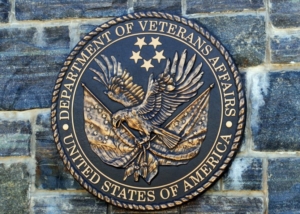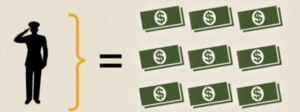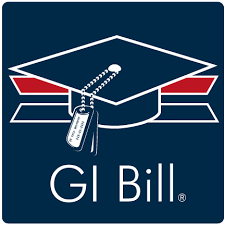The Post-9/11 GI Bill’s Yellow Ribbon Program
Contributed by Alan Rohlfing
The “yellow ribbon” has been symbolic among Americans for many years. We displayed those ribbons everywhere in support of Americans being held hostage in Iran and the Persian Gulf War inspired countless numbers of our loved ones (my own parents included) to decorate clothing, trees, and even county courthouse columns with yellow ribbons to demonstrate support of those deployed.
More recently, the Department of Veterans Affairs has chosen to leverage that highly positive symbolism when naming a key benefit for military Veterans and their families. Established by the Post-9/11 Veterans Educational Assistance Act of 2008, the Yellow Ribbon Program allows colleges, universities, and other degree-granting schools in the United States to enter into an agreement with the VA to fund tuition and fee expenses that exceed the amounts payable under the Post-9/11 GI Bill. In short, the Yellow Ribbon Program helps make up the difference when the GI Bill just isn’t enough … degree-granting institutions of higher learning that participate in the Post-9/11 GI Bill Yellow Ribbon Program agree to make additional funds available for your education without an additional charge to your GI Bill entitlement.
Here are some key highlights of the program, straight from the VA. Of course, in the realm of benefits things are always subject to change; in order to nail down the most current information, visit https://www.benefits.va.gov/gibill/yellow_ribbon.asp…
Additionally, your school must agree to participate in the Yellow Ribbon Program; your school must have not offered Yellow Ribbon to more than the maximum number of individuals, as stated in their participation agreement; and your school must certify your enrollment to the VA and provide them Yellow Ribbon Program information.
Of course, not every institution of higher learning is part of the Yellow Ribbon Program. For a listing of schools that are participating in the 2019-20 school year, visit https://www.benefits.va.gov/GIBILL/yellow_ribbon/yrp_list_2019.asp. In addition, participating schools have the flexibility to designate the number of students they will assist and the amount of contributions based on student status (as in undergrad, grad, or doctoral) and college or professional school. It might be good to touch base with your school’s certifying official, as well, for details on how they fit into the program.
Finally, the Yellow Ribbon Program received some enhancements as part of the Forever GI Bill (aka The Harry W. Colmery Veterans Educational Assistance Act of 2017). Just to reiterate what I mentioned above, effective August 1, 2018 Fry Scholarship and Purple Heart recipients became eligible for the Yellow Ribbon benefits and on August 1, 2022 certain members of the Armed Forces serving on active duty will eligible.
The application process isn’t too complicated…if you submit an application for the Post-9/11 GI Bill to the VA and are eligible at the 100% benefit level, the VA will issue you a Certificate of Eligibility advising that you are potentially eligible for the Yellow Ribbon Program. They say that you should provide your Certificate of Eligibility to the school which, in turn, will determine if there are slots available for the Yellow Ribbon Program (based on its agreement with the VA).
Once the Department of Veterans Affairs started redesigning the current-era array of educational benefits (beginning with the Post-9/11 package), many among us have decided to give ‘higher ed’ the ol’ college try. And the way the Yellow Ribbon Program has helped bridge the gap for many Veterans, especially with the recent enhancements I just mentioned, has made a tremendous impact for many of our Brothers and Sisters.
Until next time…
End of Semester GI Bill Update
We reported a few weeks ago in GI Benefits in Limbo that GI Bill housing and tuition payments have been delayed as a result of the Harry W. Colmery Veterans Education Assistance Act of 2017. The sections of the law, which were implemented in 2017, required a complete overhaul and upgrade of the Veterans Benefits Administration technology infrastructure. While those upgrades were to be completed by this previous August, as of November, the majority of the upgrades had yet to be made and therefore payments were delayed across the country.
Fortunately for GI Bill recipients, the VBA has made progress and was able to update the thousands of students who have been waiting on payments.
Effective last week, the VBA had put in place a plan to be able to process the Spring 2020 semester by December 2019. This includes addition staffing and support as well as the solicitation of contractor bits.
While this is something to look forward to for many students, the VBA is also making adjustments to assist the students with immediate needs. The month housing allowance rates will be set to the Department of Defence Basic Housing Allowance rates. In many cases, this rate is equal to or higher than the payments that have been received previously. Additionally, the VBA will be correcting the underpayments retroactively.
Even better news for those who happened to be fortunate enough to have received an overpayment this year, the VBA will not be collecting those overpayments. Housing payments will be paid out according to the location of the academic institution’s main campus and will be independent of the student’s actual physical address.
All of these changes will come to a close on December 1, 2019. It is expected that VBA will have developed and implemented a satisfactory IT solution for sections 107 and 501 of the “Forever GI Bill” law. Many of the changes are an attempt to make the process easier for all participants. Changes such as more easily defining training sites as school campuses when will reduce burden and work for both students and schools. VBA is expected to remain in constant contact with Veterans, service organizations and Congress on the status of the implementations and expectations throughout the process. The call for increased communication is in response to claim levels being triple that of normal in September of this year. While VBA claims levels are back to normal, they are encouraging schools and students to get Spring submissions in early to ensure timely payment.
Secretary Wilkie said “Redesigning the way VBA calculates Post 9/11 GI Bill housing rates during a busy academic season was like flying a plane while building it, and that was unfair and frustrated to Veterans and taxpayers. That’s why we are resetting our implementation of the law for the next year to ensure we get the technology and formula right to put Veterans first. In the meantime, beneficiaries receiving Post 9/11 GI Bill housing allowances will be paid at the DoD BAH rate, which in many cases will be equal to or higher than their current payment.”
Some other important details to remember:
GI Benefits In Limbo
If you have been attempting to use your GI Benefits lately, you might already know what thousands of Veterans are finding out – your GI Benefits just aren’t coming.
In a technological glitch and resulting nightmare, the VA is experiencing a huge backlog which started after President Trump’s signing of the Forever GI Bill last year. The 2017 legislation expanded benefits for Veterans and their families. However, with bill did not provide for a change in the system infrastructure. The result? A technological bottleneck that has delayed payments to recipients across the country. Initially, the VA was given until August 1, 2018 to put the 34 new provisions in place. That deadline was missed but the promise to hit a mid-August deadline was made. This goal was also missed.
During this week’s Veterans’ Affairs Committee hearing, Senator Johnny Isakson (R- GA) had the following to say:
“The changes that should’ve been made in information technology weren’t made. The checks and balances we have built into the system weren’t followed.”“It’s come to my attention that the [VA] has screwed up accountability and responsibility for a Forever GI Bill benefit. The changes that should’ve been made in information technology weren’t made. The checks and balances we have built into the system weren’t followed.”
The checks and balances weren’t followed and the results are nearly catastrophic.
According to the VA, at least 82,000 recipients are currently awaiting housing payments. While that number is astronomical, the true number of impacted Americans is unknown. It is estimated that the number is actually in the hundreds of thousands. All involved parties agree that this non-partisan issue needs to be rectified, Representative Phil Roe (R – TN), the chairman of the House Committee on Veterans Affairs, has been quoted as saying “this is, to be kind, a train wreck.” The train wreck continues to take out more collateral damage with every passing day as an increasing number of Veterans find themselves in dire straits without the benefits that they have been promised and were expecting.
While the VA has acknowledged the problem, which first began rearing its ugly head this past summer, there is no concrete or conclusive plan in place to actually fix the debacle. Worse yet, VA officials were warned by advocates and lawmakers that this would happen prior to the system collapse.
Dr. Paul R. Lawrence, top-ranking benefits’ official for the VA, appeared in front of the House Veterans’ Affairs Committee on Thursday and obviously struggled as he attempted to explain the situation and lack of progress. Estimates have been provided previously and remain unmet. At this time, Lawrence claimed the previous timetables were a “mistake” and the VA had no current estimate for when the technological issues might be resolved.
While outdated technology is plaguing the VA in their fulfillment of GI Benefits, it is nearly destroying Veterans who are supposed to be supported by those benefits. With just weeks left to the fall semester, many Veterans find themselves crippled with unexpected housing and academic costs. Heartbreaking stories of Veterans in crisis at the hands of the GI BIll program are popping out of the woodwork every day.
Dan Gorman, former sailor and NY National Guardsman is just one of those stories. Gorman was scheduled to graduate in May 2019, but with the current delays crippling his finances, that goal seems less and less likely every day.
“I can’t afford rent. I can’t afford groceries. It’s a lot of emotional strain and aggravation,” said Gorman.
According to Curt Cashour, VA Press Secretary, the VA has implemented 28 of the 34 changes. However, housing and tuition and reimbursement were not two of them and no estimate was given for when the remaining changes would be completed.
The most unfortunate twist in this mishap is that the VA failed to notify students of the potential pitfalls, even after they were aware. Students, like Gorman and many others, have been waiting for their checks to arrive – but they never do. Given that two of the major changes that have not been rolled out are those that impact living allowances and tuitions, Veterans find themselves unable to afford both school and day-to-day survival.
According to the VA, an additional 200 IT-based employees have been added to staff to assist with the remaining rollouts. The VA has had a year to complete the required IT upgrades and is now nearly four months past the original due date. While the additional staff and pressure from the House may help push the project to completion, it is of little consolation for those Veterans who find themselves being forced to give up their education.
The VA’s GI Bill Hotline is 888-GIBill-1 and the White House VA Hotline is 855-948-2311. If you or someone you know has received an incorrect disbursement, is missing a stipend or reimbursement, please contact these hotlines for assistance.

GI Benefits and YOU
Contributed by Kris Baydalla-Galasso
It is “back to school” season across the country. Our college campuses are getting ready to welcome a new crop of freshmen students with open arms – and some are getting ready to welcome our military veterans into the ranks of their student body. Unavoidably, the cost of a four-year degree is on the rise. While there are a host of private grants, scholarships and financing available – active military, select reservists and National Guard members earn education benefits that will help make a post-service education more affordable.
Depending on where you attend school, your GI Benefits might just cover all of your expenses. For example, if you are attending a public college or university, you can expect to have your tuition covered and paid directly to your school. Additionally, the post 9/11 GI Bill provides a monthly housing allowance as well as an annual supply allowance.
In order to qualify for GI Benefits, you need to have served at least two years of active duty and have completed high school (or have a HS equivalency certificate). During your first year of active duty, your contribution needs to be $100 per month. You can also quality under VEAP (Veteran’s Educational Assistance Program). Once you have served and contributed the minimum to qualify, you are eligible to apply for benefits through the VA. Your initial application may take as long as 10 weeks, so allowing for enough time is critical.
Everyone’s life path is different – so while some soldiers look to enroll as soon as they are no longer serving, some may have other plans in mind. The GI Bill protects these plans as well, as veterans have 15 years to apply for benefits after their most recent period of active duty. Once your application is submitted, your benefits will cover up to your first 36 months of school.
There are so many options when expanding an education. Some higher learning institutions pride themselves on working with military personnel and veterans. St. Bonaventure University in New York boasts a strong ROTC program – but it also makes it easy for active personnel to put a degree on hold to serve overseas. Columbia Southern University in Alabama boasts an extensive selection of online degree programs as well as open enrollment, catering to the hectic schedules and unpredictable nature of military scheduling.
Colorado State University has a devoted team of advisors dedicated to assisting military personnel and veterans. So much that they even have a special “Military and Veteran Student Visit Day” next month. Drexel, in Philadelphia, PA, has a unbeatable online degree and course offering. Don’t forget to check out Touro University Worldwide – an online program that makes obtaining a degree easier for those of us who need to move around.
Between the GI Benefits and the institutions who are actively trying to work with veterans, now is a fantastic time to start a pursuit of a degree!

The GI Bill is one of the most amazing benefits offered to those who serve. By using this benefit, veterans can earn a degree or vocational certificate, get paid while in school, and jump-start their post-military lives.
Touro University Worldwide (TUW) understands the importance of educating our country’s active military students and veterans who are preparing to enter the civilian workforce. To that end, in addition to government funding options, TUW offers discounts to to those who serve, past and present, as well as extending the benefit to their families.
Many Touro academic staff members are also veterans, and since they have walked the walk, they can provide support and guidance through the military aligned students’ academic journeys.
While there are thousands of schools throughout the country that would like to be on the receiving end of the tuition funding that military and veterans bring via the GI Bill, TUW has a tradition of commitment to their military and veteran students.
Make this the year that you get started earning the degree that will give prepare you for an exciting career in business, psychology or health and human services. Apply the skills and knowledge you acquired in the military to a bachelor’s or master’s degree with in-demand concentrations like: Cybersecurity Management, Global Management, Nonprofit Management, Human Resources Management and many more!
You’ve always risen to the challenge, make this the year that you pursue and complete your degree!
For more information, visit www.tuw.edu

Statute 38 U.S.C. 3683 is an ethics law that prohibits Department of Veterans Affairs employees from receiving money or owning a stake in for-profit colleges.
But the VA is now pushing back, claiming that the 50-year-old statute is redundant due to the other conflict-of-interest laws that apply to all federal employees and provide sufficient safeguards.
You may be wondering why this is important.
Veteran advocacy groups believe that doing away with the law would make it easier for the for-profit education industry to exploit veterans with their rich GI Bill benefits.
There is mounting concern that suspending the statute would make it possible for high-ranking agency officials to enact policies that benefit for-profit schools in which they have a financial interest.
“The statute is one of many important bipartisan reforms Congress implemented to protect G.I. Bill benefits from waste, fraud, and abuse,” said William Hubbard of Student Veterans of America. “A thoughtful and robust public conservation should be had to ensure that the interests of student veterans is the top of the priority list.”
“Congress enacted a zero tolerance for financial conflicts of interest for VA employees precisely because Congress uncovered massive fraud by for-profit colleges targeting veterans.”
“Student veterans were already facing an aggressive rollback of their protections under the Trump administration’s Education Department,” said Carrie Wofford, president of Veterans Education Success. The non-profit group works to protect and defend the integrity and promise of the GI Bill and other federal education programs for veterans and servicemembers.
The law already provide measures for any employee that it covers to receive a waiver if they can prove that there is no conflict of interest and that whatever arrangement they have or had will not be a detriment to veterans.
The VA proposal is set to go into effect on October 16 unless the agency “receives a significant adverse comment” by or on that date.
Unfortunately, to date, no such comments have yet been submitted nor have any public hearings been scheduled.
What do you think?
Military Connection salutes and proudly serves veterans and service members in the Army, Navy, Air Force, Marines, Coast Guard, Guard and Reserve, and their families.

By Debbie Gregory.
When separating from their military service, there are many newly-minted veterans who aren’t desirous of attending a traditional college or university to cash in on their veteran school benefits. A better fitting veteran education option for them might be on-the-job (OJT) training or an apprenticeship program.
Both OJT and apprenticeship programs are available for veterans using their VA GI Bill education benefits, one of the most valuable veteran benefit.
These programs give veterans the opportunity to learn a trade or skill through training on the job participation rather than attending formal classroom instruction. The programs generally consist of entering into a training contract for a specific period with an employer or union. At the end of the training period, the veteran has earned job certification or journeyman status.
Usually, employers pay a reduced OJT/apprenticeship wage, which must be at least 50% of journeyman’s wage, with periodic wage increases, unless it’s a government program. By the last full month of training, the wage must be at least 85% of the wage for a fully trained employee.
In addition to the wages paid by the employer, veterans who are participating in an approved program can use their GI Bill benefit and receive a tax-free stipend equivalent to the Monthly Housing Allowance (MHA) of an E-5 with dependents. However, the stipend is reduced 20% every six months as the Veteran’s wages regularly increase until the Veteran has attained journeyman status and pay.
If traditional college/university education, OTJ training or an apprenticeship doesn’t fit the bill, one other option is available: beneficiaries can use their educational assistance to pursue accredited independent study programs at career and technical schools that provide postsecondary level education and postsecondary vocational institutions. This change went into effect August 16, 2017.
Military Connection salutes and proudly serves veterans and service members in the Army, Navy, Air Force, Marines, Coast Guard, Guard and Reserve, and their families.

By Debbie Gregory.
Before taking office last year, Donald Trump agreed to pay $25 million to settle multiple lawsuits claiming fraud at Trump University, his for-profit real estate school.
Last month, the Trump administration announced that Julian Schmoke Jr., a former official at for-profit DeVry University, would be in charge of a Department of Education unit that polices colleges for student aid fraud. Last year, DeVry paid $100 million to settle federal claims it misled students, including veteran education programs.
And now, the Trump administration is seeking to waive an anti-corruption law that has been on the books for 50 years. The law prevents officials who administer the GI Bill from accepting money from for-profit schools backed by taxpayer subsidies.
The waiver would allow employees of the Department of Veterans Affairs to receive “wages, salary, dividends, profits, gratuities” and services from for-profit schools that receive GI Bill funds.
Veterans’ advocates, who have battled for veteran education rights against predatory colleges, were blindsided.
“Bizarre and very likely illegal,” said Carrie Wofford, president of Veterans Education Success. The non-profit group works to protect and defend the integrity and promise of the GI Bill and other federal education programs for veterans and servicemembers.
“There are federal laws – including federal criminal laws – that prohibit federal employees from engaging in this exact behavior,” she said.
The rule change could create conflict of interest where VA officials, who are charged with ensuring GI Bill funds are well spent, could accept payments from colleges facing scrutiny.
VA employees could also own or run a for-profit college that profits from the GI Bill.
The VA angered many veteran advocates by allowing for-profit Ashford University to continue receiving GI Bill money, this in spite of the fact that California and Iowa regulators revoked its certification from the program.
Ashford circumvented the revocation by moving its official address from Iowa to Arizona.
Military Connection salutes and proudly serves veterans and service members in the Army, Navy, Air Force, Marines, Coast Guard, Guard and Reserve, and their families.

By Debbie Gregory.
Patriotism is usually among the top three reasons people give for joining the military. So is the promise of great educational benefits provided through the GI Bill. With that said, changes to the Post-9/11 GI Bill and other education benefits would probably have a bigger impact on military recruitment and retention if the recipients actually understood what they were getting.
It is common knowledge that a college education is expensive. A recent RAND report evaluating military education benefits revealed that many new recruits and service members don’t really understand what their benefits entail.
Some of the benefits you could be eligible for through the Post-9/11 GI Bill include 100% coverage of tuition and fees paid directly to a state operated college or university on your behalf, a monthly living stipend based on your school’s zip code, an annual book and supply stipend, a one-time relocation allowance, and the ability to transfer GI Bill benefits to a spouse or eligible dependent. And since 2009, servicemembers are not required to contribute to the program to access the benefits.
Veteran advocacy groups, including the Student Veterans of America, have been pushing Congress to make changes to the Post-9/11 GI Bill that would expand eligibility for wounded service members and reservists.
For the report, RAND researchers polled 165 new recruits who had yet to attend boot camp, in order to ascertain how much they knew about the Post 9/11 GI Bill education benefit. While education was among the recruits’ commonly cited reasons for joining the military, many were unclear about the actual details of the Post-9/11 GI Bill. The new recruits who were well informed about the benefits were generally older, more likely to have college experience and more likely to be female.
Military Connection salutes and proudly serves veterans and service members in the Army, Navy, Air Force, Marines, Coast Guard, Guard and Reserve, and their families.
© 2006-2020 Military Connection, Owned by BL, LLC. All rights reserved